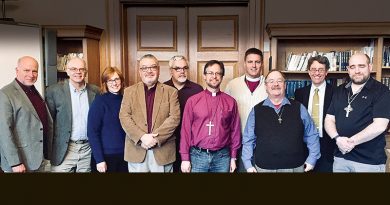Diocese of Saskatchewan: Long COVID forces Bp Hawkins to retire early
By Sue Careless
HE SURVIVED a severe bout of COVID-19 when it struck him two years ago, but the Bishop of Saskatchewan has found its long-term effects so devastating that he is stepping down on April 30, the third Sunday after Easter.
Bp Michael Hawkins was in intensive care for 12 days with COVID in early December of 2020.
“My physical health continues to improve but my mental health and cognitive function remain compromised,” Hawkins said in an Oct. 14 charge to the diocesan synod. Despite following the advice of his doctors to take some time off and work shorter hours, he still feels the need to retire.
“I feel at times burdened and guilty that I am not able to give my ministry and work and the Diocese what they need and deserve,” he told the synod.
“The diocese, its people and congregations, its executive committee … have been extraordinarily generous, kind, compassionate, patient and supportive over the past twenty-two months. I could not ask for more and I am often overwhelmed by your goodness to me and sometimes embarrassed by it. Thank you and thanks be to God.”
In Canada 47 per cent of adults with long COVID experienced symptoms for a year or more.
After serving as the rector of two parishes in Nova Scotia, Harper was appointed rector of St. Alban’s Cathedral in Prince Albert in 2001 and was elected Bishop of Saskatchewan in 2009.
Prayer Book
He is also the Episcopal Visitor to the Prayer Book Society of Canada (PBSC). As such he acts as a liaison between the Society and the House of Bishops and advises their National Council.
In their Michaelmas 2021 newsletter he wrote: “The Prayer Book has been central to my spiritual life ever since my undergraduate days at Kings College in Halifax…I serve a diocese that uses mostly the BCP. Our Cree parishes use it almost exclusively.”
He continued: “I think that the Prayer Book is essential for Anglicanism. Without that distinct heritage and patrimony, that we learn from and grow into, there is no reason for us to exist as a separate stream within the Church. I think the Prayer Book is the way that we’ve been given to connect to our catholic and reformed tradition.”
He also wrote that penitence is “a key aspect” of the BCP. “I think one of the most moving points of the Prayer Book Communion service is when the priest kneels with the people at the moments of penitence and humility – at the confession and the Prayer of Humble Access. In those moments, there is no distinction between priest and people. And that is community-building. Also, the Prayer Book is uniquely gifted in being a reformed liturgy that holds out the teaching of simul justus et peccator – that is, we are at the same time justified and yet sinners. And that precludes self-righteousness.”
He noted that during the pandemic the new BCP app proved to be a “life-saving gift” to him especially when he was hospitalized in isolation. “In my foggy mental condition, it was a real blessing” and helped him pray the daily offices.
Diocese
The Diocese of Saskatchewan serves the northern two-thirds of the civil province of Saskatchewan where there are 68 scattered Anglican congregations grouped into 32 parishes. Its Anglican population is about 23,000, sixty per cent of whom are Cree. At least half of these are under the age of 25. There are four youth retreats that happen throughout each year, while Camp Okema as well as Vacation Bible Schools operate during the summer.
The Diocese has always been bilingual, Cree and English, and worship has always been primarily from Cree and English editions of the Book of Common Prayer.
In 1989 the first Indigenous bishop in the ACoC, Charles Arthurson, was consecrated suffragan bishop of Saskatchewan.
The Bishop of Missinippi, or Diocesan Indigenous Bishop, Adam Halkett was consecrated in 2012 as part of a vision called mâmawi isi miywâcimowin – “Together in the Gospel.”
Today the Diocese has 25 active and 15 retired clergy, two catechists, 110 lay readers, and two bishops. The majority of the active clergy are non-stipendiary.
The Diocese is a member of the Council of the North and receives almost half of its annual funding from a grant given through that Council.
In his charge to the synod last October, Hawkins said: “We are saved by hope. If we have not hope, we are nothing. I have tried to set before you a vision this evening, a vision of committed disciples drawn together…in mission and love.” TAP




